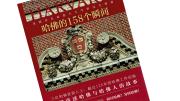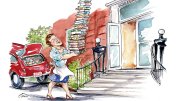One casualty of the 2008-2009 financial crisis and ensuing Great Recession was the Faculty of Arts and Sciences’ physical Courses of Instruction catalog: it and the Student Handbook, Q Guide, and other publications got the ax as of April 1, 2009, segueing to online-only formats (“Printed Catalogs: R.I.P.,” July-August 2009, page 55). And that seemed to be that—particularly in light of subsequent events, such as the March 2020 pandemic-induced pivot to online instruction.
But nothing is forever. At the first FAS meeting this academic year, on October 11, Harvard College dean Rakesh Khurana lugged around a reborn printed, bound course catalog, of a sort. Some 50 copies of an enormous volume, hardbound in handsome dark blue, were manufactured this year, he said, as part of the College’s “commitment to preserving our records of our intellectual output.” He noted that physical copies from prior years have proven valuable to researchers, faculty members writing memorials for retiring or deceased colleagues (see below for an example), and students returning from long leaves of absence who need to trace their progress toward a degree. Limited editions of the Student Handbook and the “Fields of Concentration” document are being printed for the same reasons.
The catalog’s girth and sheer heft—nearly 1,600pages; a newborn-sized 6 pounds, 4 ounces—reflect both the number of courses and lengthier descriptions for many of them (perhaps a result of professors feeling their oats describing their offerings online of late, where the space to write is infinite). So maybe it is just as well that this tome won’t be appearing in campus mailboxes soon.
• • •
Even as China and the United States decouple, reducing the presence of students from the People’s Republic on U.S. campuses, information on higher education here continues to circulate there. Harvard Magazine editor emeritus John T. Bethell ’54 reports that his handbook Harvard A to Z (written with the late University Marshal Richard M. Hunt and the late University Secretary Robert Shenton, and published by Harvard University Press in 2004) has had a second life, too, in a new edition from Peking University Press. The Simplified Chinese translation is by Kai Chen, assistant professor at the School of International Relations, Xiamen University, and visiting scholar at the University of Oxford China Centre.
A blurb on the Chinese edition’s back cover promises insight into “the real Harvard beneath all the glitz and glamour.” While the phrase “A to Z” appears atop the front cover, the title has transmogrified into Hafo de 158 Ge Shunjian (“158 Moments at Harvard”)—a nod to the number of topical entries.
To translate the cover lines, Bethell enlisted Professor Jennifer Li-Chia Liu, director of Harvard’s Chinese language program, and Linlin Xiong, a teaching assistant. Liu noted in passing that “the use of moments in Chinese suggests ‘highlights, snapshots,’ which may grab readers’ attention, and it also seems to be in accord with the fragmented reading that is so popular in this day and age.”
On the Harvard (“Hafo”) campus, for sure, and certainly in screen-obsessed China.
• • •
A different sort of bookishness was celebrated in the faculty’s October memorial minute on the late Gerald Enoch Sacks, professor of mathematical logic emeritus at Harvard and MIT, who died in 2019. Though most toilers in the humanities, social sciences, and natural sciences would not know, Sacks was celebrated within his field for his “pioneering” and “exhaustive” study in a monograph, Degrees of Unsolvability (on “many aspects of degree theory”), for Saturated Model Theory (“a popular choice for a first course in model theory for several generations of students”), and for Higher Recursion Theory (“the main reference today for…that topic”). The Association for Symbolic Logic’s Sacks Prize, recognizing his mentoring of outstanding students, is awarded each year to the author of the best Ph.D. thesis in mathematical logic, worldwide.
That honor and the endurance of his books aside, it comes as a relief to those neither mathematically inclined nor strictly logical to learn that Sacks was hardly all work and no play. According to the memorial, he was also “a voracious reader with an extensive library, wrote poetry, and was a movie buff with an extraordinary recall of highlights” from films.








